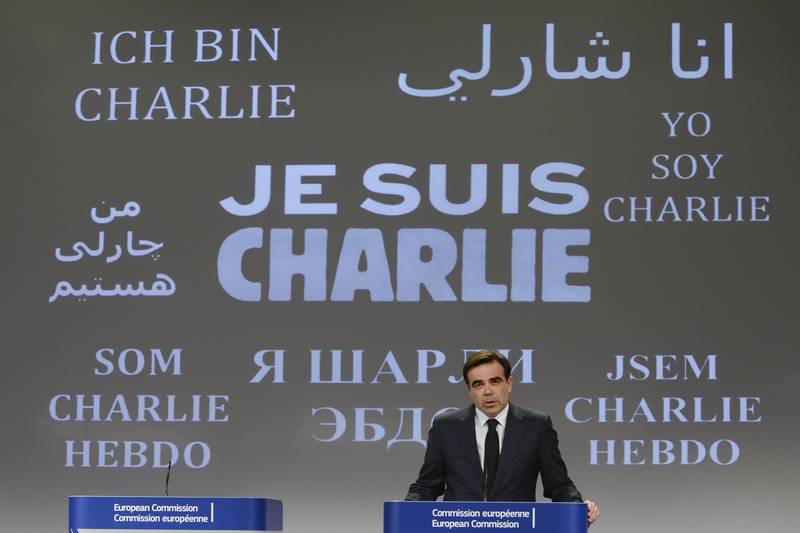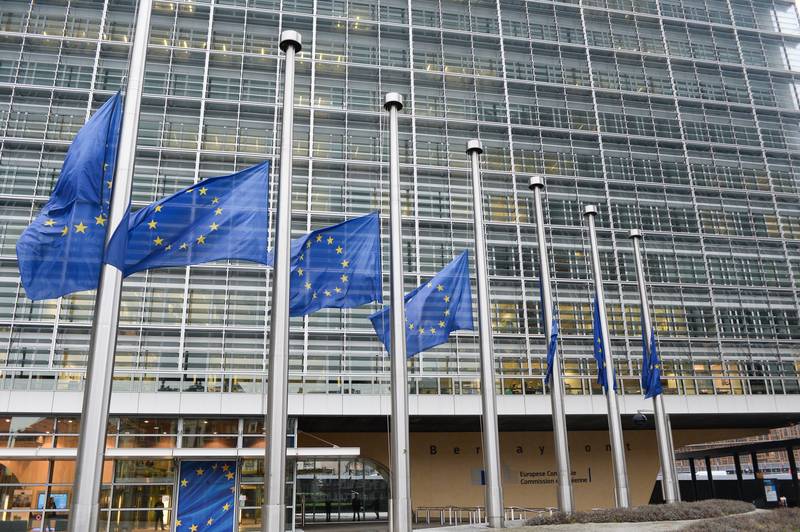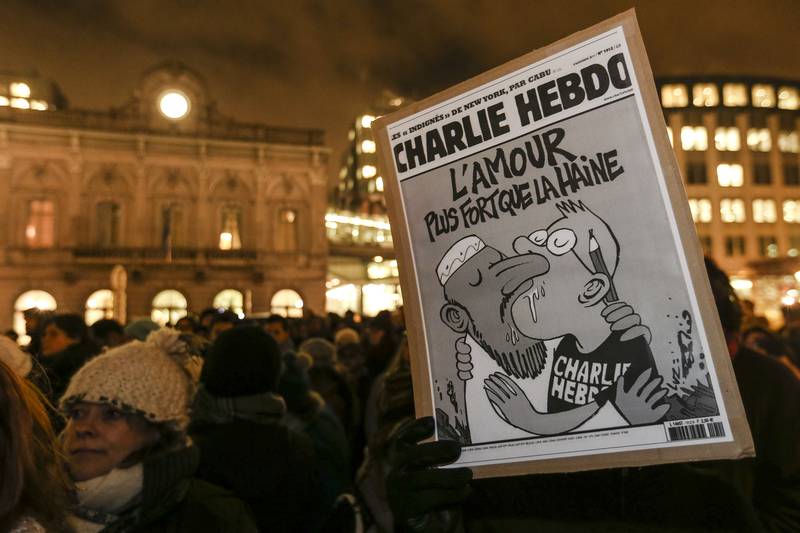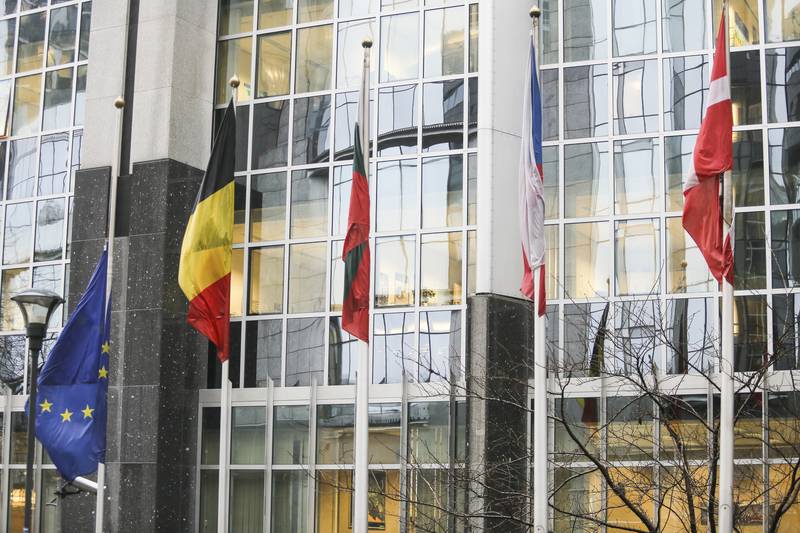9/11 for the Freedom of Expression
Adelina Marini, January 9, 2015
 7 January 2015. The day when the freedom of expression sustained its first large-scale and bloody blow. A little before noon, Europe was hit in the heart, in its most dear - the freedom of expression and freedom in general. Moreover in France, the homeland of Liberté, Égalité, Fraternité. The EU's most powerful weapon was dared - its values. Armed with Kalashnikovs masked attackers raided the office of the French satirical magazine Charlie Hebdo and killed in cold blood 12 people among whom some of the most famous cartoonists in the world. They did this shouting "The prophet is revenged" and "In the name of God". This unleashed unprecedented reaction of solidarity and unity in the entire democratic world. Unseen and inspiring unity as in terms of what exactly was hit and that it is indeed fundamental.
7 January 2015. The day when the freedom of expression sustained its first large-scale and bloody blow. A little before noon, Europe was hit in the heart, in its most dear - the freedom of expression and freedom in general. Moreover in France, the homeland of Liberté, Égalité, Fraternité. The EU's most powerful weapon was dared - its values. Armed with Kalashnikovs masked attackers raided the office of the French satirical magazine Charlie Hebdo and killed in cold blood 12 people among whom some of the most famous cartoonists in the world. They did this shouting "The prophet is revenged" and "In the name of God". This unleashed unprecedented reaction of solidarity and unity in the entire democratic world. Unseen and inspiring unity as in terms of what exactly was hit and that it is indeed fundamental.
From Belgrade through Sofia and Tirana to Amsterdam, London, Madrid. From everywhere were tweeted condemnations of the kind we have never seen before. Not even for the attacks in Madrid and London. Twitter literally exploded in tweets from all ends of Europe and the world. Most of them were unanimous that this is not simply a killing of 12 civilians. This is an attack on democracy. "I consider it an attack on the media but also on fundamental values of Europe: democracy and freedom of speech", said Poland's Prime Minister Ewa Kopacz. "The murders in Paris are sickening. We stand with the French people in the fight against terror and defending the freedom of the press", said the tweet of UK's Prime Minister David Cameron. "The attack on Charlie Hebdo is an attack on the fundamental human liberties which at any time and with all means it is worth fighting for", tweeted Croatia's MEP from the Conservative group Ruza Tomasic.
"I agree with the French imam who today called the slain journalists martyrs for liberty. Today’s murders are part of a larger confrontation, not between civilisations – no – but between civilisation itself and those who are opposed to a civilised world", said John Kerry, the US secretary of state who joined the entire world in condemning the terrorist attack in French. "The conflict we have in Ukraine is not just the conflict between Ukraine and Russia. It's the global one. We are fighting for our independence, for our freedom, for our country, and our land. And we have to stay united in fighting with terrorism", said Arseniy Yatsenyuk, prime minister of Ukraine.
The world not only spoke and wrote in French but the statements of the political leaders were far from the usual protocolistic condolences. In a rarely timely and adequate statement, Bulgaria's Prime Minister Boyko Borissov said: "This bloody terrorist act causes anger in us against the violent taking of human life and aggression against freedom of speech. We express our solidarity with the French people in this difficult moment for all of us in Europe and solidarity with the grief of the families and loved ones of the deceased. There is no cause that can justify terror. As allies in NATO and EU, Bulgaria and France work together to repulse the new threats for security and peace. Together with our partners we are convinced that terrorism will be defeated whatever efforts this fight might require".
Croatia's President Ivo Josipovic, too, was emotional: "With this terrorist act a brutal blow was struck on the values of the free democratic world". And the prime minster of Slovenia, Miro Cerar, wrote on Twitter: "I strongly condemn this outrageous act of terrorism aimed at the freedom of press - one of the greatest civilisational achievements - and I express Slovenia's complete solidarity with France, the media and the families of the victims".
 However, there was no way to escape noticing the fact that the countries where press freedom is not fully respected rarely mentioned in their condolences that freedom. Although the statement of Serbia's Prime Minister Alexander Vucic was really deeply heartfelt, there was no word in it about media or media freedom. "We're terrified from what happened, but we are certain that the Republic of France and the great French civilisation, known for its tolerance, will succeed in fighting the threat of terrorism", was the official statement of the Serbian premier.
However, there was no way to escape noticing the fact that the countries where press freedom is not fully respected rarely mentioned in their condolences that freedom. Although the statement of Serbia's Prime Minister Alexander Vucic was really deeply heartfelt, there was no word in it about media or media freedom. "We're terrified from what happened, but we are certain that the Republic of France and the great French civilisation, known for its tolerance, will succeed in fighting the threat of terrorism", was the official statement of the Serbian premier.
Serbia is a key country in the EU enlargement to the Western Balkans. In the enlargement strategy of the European Commission in the past years the attention toward media independence has increased significantly. The message from the Kremlin sounded protocolistic and distant. In it, it is pointed out that President Putin condemns "the cynical crime" and affirms his readiness to continue the active cooperation in the fight against terror. Concise was also the message of Hungary's Prime Minister Viktor Orban.
Impressively long and deep was the statement of Albania's Prime Minister Edi Rama. "Albanians are saddened and revolted beyond words for what happened today at the heart of the European civilisation of freedom and human rights. [...] But I am sure that the barbaric shock to a living monument of moral freedom as Charlie Hebdo, and taking the innocent lives of the talented journalist of a prominent French newspaper, will increase the awareness of all our peoples for the extraordinary human wealth that our civilisation represents".
Do we respect our own freedom of expression?
The murder of the 12 colleagues is also a sobering moment. A moment of realising that although the freedom of speech is one of the inherent values of the EU, it is not at all understood unequivocally in the Union itself. Yesterday, Twitter was bursting along the seams of condemnations and condolecences. Everyone was putting "Je suis Charlie" as their profile or cover photo on Facebook or Twitter, including the accounts of the big political families in the EU - EPP, Socialists and Democrats, ALDE. These parties, however, have sinned in terms of the freedom of expression in Europe. They acquiesced the process of slow killing, although not with Kalashnikovs, of the media freedom in Hungary, Bulgaria. And as if to clean its face, the EU raised its exigence on the issue for the candidate countries from the Western Balkans.
But does the EU have a face to demand media freedom in the candidate countries since it is failing to ensure it within its own borders? According to the press freedom index of Reporters without Borders for 2014, Hungary, which significantly limited its media freedom, has fallen by 8 seats and now ranks 64. Bulgaria went 13 places down and is now ranked 100. Losses of media freedom are also registered in Romania (-3), Greece (-15) and even France (-2). The lack of media freedom is the perfect environment to develop tolerance for hate speech. And this can today be easily observed across Europe. In Bulgaria,  hate speech has reached terrifying rates. In Serbia, too, there is significant deterioration although, according to the press freedom index, the country climbed 9 places up to 54 seat.
hate speech has reached terrifying rates. In Serbia, too, there is significant deterioration although, according to the press freedom index, the country climbed 9 places up to 54 seat.
According to the European Commission progress report of enlargement, however, the media environment in Serbia has deteriorated significantly last year. Not only the media environment, but also hate speech which has increased remarkably with the return of the war crimes defendant and former Yugoslav leader Vojislav Seselj. And in Montenegro, the murders of journalists in the past decades have still not been uncovered. In Macedonia as well there is a regress in terms of media freedom and serious deterioration of the media environment can be observed.
In some parts of the EU there is not only a deterioration of the media environment but also a rejection of liberal democracy. This happened in Hungary last year when Prime Minister Viktor Orban announced a change of regime toward illiberal democracy of the type Russia and Turkey have. All this happened while his peers in the European Council were silently watching and remained unpunished by his European political family the EPP. There were attempts for sharp reactions in the European Parliament but they remained words only and were not supported by all the political forces. EU has sinned in terms of Bulgaria as well where, like never before, there is a complete seizure of the media environment by a single empire led by the famous Delyan Peevski, a member of parliament from the Movement for Rights and Freedoms (DPS), which is part of the Alliance of Liberals and Democrats for Europe (ALDE). Despite its major complicity in the deprivation of media independence, DPS has never received a single condemnation by the ALDE leadership. Romania, too, had serious problems with the media environment but after the unprecedented interference of the European Commission the situation has started to improve. That is why, the EU should seriously begin work and clean its own media courtyard to be able to gracefully put a tag "Je suis Charlie" on its face.
"A fundamental principle of democratic systems is that equal rights are accorded to all citizens, with the possibility of their direct or indirect participation in collective decision‐making, especially through free elections, the choice of political representatives and the power to hold elected officials accountable. If citizens are to exploit these rights to the fullest, however, they must have free access to information that will give them sufficient basis for making enlightened judgements and informed political choices.2 If not, control over the flows of information and manipulation of public opinion can lead to a concentration of power, the ultimate form of which is seen in authoritarian and totalitarian systems, which use both censorship and propaganda as tools for staying in power".
This is how the report of the high level group on the problems of media begins, prepared under the auspices of Neelie Kroes, the former EU commissioner responsible for media. The report was published in January 2013 and was inspired by the problems with the media environment in several EU member states and especially Bulgaria where journalists, this website including, demanded a meeting with Ms Kroes. The document makes a number of recommendations how the problem can be handled at EU level, as one of them says: "The EU should be considered competent to act to protect media freedom and pluralism at State level in order to guarantee the substance of the rights granted by the Treaties to EU citizens, in particular the rights of free movement and to representative democracy. The link between media freedom and pluralism and EU democracy, in articular, justifies a more extensive competence of the EU with respect to these fundamental rights than to others enshrined in the Charter of Fundamental Rights".
When Mr Borissov talks about freedom of speech he should be reminded that in his own country that freedom has been taken away under his watch. After the fall of his first government two years ago, a minister from his cabinet admitted in front of media that the government used to exert media pressure  and participated in the empowerment of Delyan Peevski's media empire. Boyko Borissov is currently a prime minister for a second time and Vezhdi Rashidov is again a minister in his government.
and participated in the empowerment of Delyan Peevski's media empire. Boyko Borissov is currently a prime minister for a second time and Vezhdi Rashidov is again a minister in his government.
7 January 2015 is the media 9/11 which marked the global war on terror. This is a tipping point for the EU to launch a relentless war against the attempts to limit media freedom in the EU. The Union but also we, journalists, have a duty to Stephane Charbonnier, Jean Cabut, Georges Wolinski, Bernard Verlhac, Bernard Maris, Philippe Honoré. Their fight for the freedom of expression should not be in vain. We should first win at home, on our territory and only then claim that we are Charlie. The war on terror was not successful for many reasons but one of them was the lack of unity in the views what means should this war be led with and at what price.
Hardly anyone doubts what are the means to fight for the freedom of expression in the EU. "The freedom and pluralism of the media shall be respected", says Article 11.2 of the Charter of Fundamental Rights of the European Union. This has always been EU's soft power in terms of foreign policy. It is high time this power to be used a bit more rigidly because the stakes are too high - apart from defending the European values, currently there is a real media war goin on globally and the EU is lagging behind.